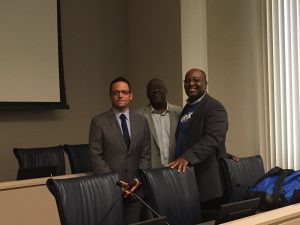
A week after the proposed state pension cuts failed to pick up the Republican votes needed to pass, lawmakers, unions leaders and business groups made their final push in the month-long negotiation over the workers’ compensation cuts – another divisive bill in Sen. John Cullerton’s (D-Chicago) ‘grand bargain’ package intended to end the state budget crisis.
The bill, sponsored by Senate Minority Leader Christine Radogno (R-Lemont), will likely include a five-year freeze on the compensation paid to permanently injured workers, reduce the number of prescriptions, chiropractic, occupational and physical therapy visits a worker may receive for injuries and limit the amount of reimbursement paid to hospitals and surgeons. The reform legislation was adamantly opposed by the Illinois AFL-CIO and other unions as another burden on the most vulnerable workers. The clash only grew stronger as the negotiations entered its final stage, with both sides being more persistent on their stances.
“The bill’s still a work-in-progress and for that, it means everything in it could be changed by amendment,” said Patty Shuh, the spokeswoman for Radogno. She said the freeze on the permanent and partial disability rate that keeps growing every year under the current compensation mechanism and the new limitations on the high-quality medical treatment would possibly go through dramatic revisions up until Feb. 15. That’s the day when the bill would be put to vote right after Gov. Rauner’s third annual budget address.
The budget address was unprecedentedly concerned because Illinois had been operating without a full budget for 19 months, which caused sharp cuts in school funding and social services. The financial mire was widely blamed on the governor who’s considered uncompromising on his approaches to less spending and more jobs, making it harder for the state’s most divisive issues, such as taxation and state workers’ benefits, to attain bipartisan agreement.
Shuh said Gov. Rauner had not been directly involved in any efforts in support or against the ‘grand bargain.’ However, the governor re-pitched his pro-business agenda to lawmakers and Illinois taxpayers during his state budget speech Wednesday, mentioning the urgent need to cut workers’ compensations for a more balanced budget and lower costs for local businesses.
“The simple question we should ask is: How will this affect job creators?” Gov. Rauner told a crowd of lawmakers and reporters in Springfield Wednesday. He said job creation was the right path to prosperity, referring to the comprehensive 12-bill package proposed by the Senate Democratic leader that addresses the state’s most controversial issues from tax increases to education funding.
Shuh said the current version of the bill did not begin to change the benefits provided to injured workers. What it does, she said, is try to “bring some sanity” to the state’s workers compensation system, which has made Illinois an “outlier” in competition for business.
Labor unions balked at the bill as the Republicans gained momentum for more cuts.
Jason Keller, the legislative director at Illinois AFL-CIO, said the freeze on the PPD compensation rate meant workers would never catch up with the cost of living. More importantly, he said the reduced amount of medical fees would create an access-to-care issue for injured workers.
“If you do another cut to the fees that hospitals and surgeons can get, they are going to say, ‘no, I’m not going to take those workers comp cases any longer. It’s not worth my time, and not worth the money I would get,’” said Keller, adding that would compel injured workers to do longer travels across cities or even counties in order to seek treatment.
Keller said they also strongly opposed placing new limitations on the crucial medical treatment an injured worker could get. He said services such as physical therapy and chiropractic care were indispensable to the workers’ rehabilitation in order to “get their bodies to a functioning level” and therefore “get them back to work.”
Mark Denzler, the vice president and chief operating officer at Illinois Manufacturers’ Association that represents more than 4,000 company members, argued the current compensation system was too expensive and that the proposed reform was no hard cut compared to Illinois’ surrounding states.
“Our employers pay on average nearly 20 percent more for workers’ compensation insurance than that in an average state,” Denzler said. “Manufacturers often pay hundreds of thousands of dollars or millions more in Illinois that their facilities or competitors may in other states.”
He said the medical costs had been spiraling upward and the proposal sought to control costs without really harming the injured workers.
“Because it does not apply to post-surgical visits and it is not a hard cap,” said Denzler, adding injured workers could go for additional visits if requested by the physician and approved by the employer or insurer.
Denzler said a local chiropractor could usually charge $30 to $50 more for a workers’ comp patient for the exact same treatment another patient may receive. He said the bill would create significant savings as Illinois paid tens of millions of dollars in workers’ comp costs every year.
“Our goals are to provide high-quality treatment to legitimately injured workers so that they can get back to work quickly,” Denzler said. “That can be done while reducing the abuses in the system that make Illinois uncompetitive.”
But Keller said the so-called savings created by the compensation cuts ultimately would not benefit local businesses.
“We did a big workers comp package in 2011 where we gave concessions,” Keller said. “[But] the billions of profits we realized from those reforms have been kept by the insurance companies that offered worker’s comp insurance. They haven’t been shared with the businesses.”







Be First to Comment